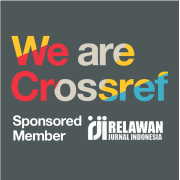RELEVANCE OF THE IMPLEMENTATION AND RESPONSE OF SHARIA ECONOMY IN THE DIGITALIZATION OF E-COMMERCE TRANSACTIONS IN INDONESIA
Abstract
Keywords
Full Text:
PDFReferences
Ansori, A (2016). Digitalization of the Islamic Economy. Islamiconomic: Journal of Islamic Finance and Business Economics, 1-18.
Anwar, S (2019). Islamic Industrial Revolution 4.0 in Responding to the Challenges of Digitalization Technology. At-Tuhfah: Journal of Islamic Studies, 8(2), 16-28.
Apartando, Pope. (1994). Popular Dictionary, Surabaya: PT. Arkola, p. 666.
Baihaki, Egi Sukma. (2020). Islam in Responding to the Digital Age: The Challenge of Maintaining Religious Communication in Indonesia. SANGKEP: Journal of Religious Social Studies, 3(2), 185-208.
Fitriani, Febri. (2020). Thesis of Pre-Order Transactions at Shopee E-commerce Perspective of Islamic Law, Surakarta: State Islamic Institute (IAIN) Surakarta.
John M. Echols and Hassan Shadily. (2003). English-Indonesian Dictionary, Jakarta: Gramedia Pustaka Utama, p. 209.
Monica, M. A. (2020). Analysis of Islamic Law on Shopee Pay Later Electronic Money Loans in E-commerce Thesis. Sunan Ampel State Islamic University.
Muhammad, M. M. (2020). In E-commerce Transactions. 2, 76–86.
Mostopha. (2018). Digitizing the Literary Collection of Balai Pustaka as a Service Effort in the Era of Digital Natives, Airlangga University Library Journal, pp 61-68
Nugroho, Fajar Cahyo. (2020). Thesis Review of Islamic Economic Law Against Iqalah in E-commerce. Manado, p. 10-11
Nurhayati. (2018). Understanding the Concepts of Sharia, Jurisprudence, Law, and Usul Fiqh. South Kalimantan: Journal of Sharia Economic Law.
Prawira, A. (2020). E-Commerce in Sharia Business Law. Az Zarqa': Journal of Islamic Business Law, 12(2), 35–56.
Saakinah, R. I. (2016). “Online buying and selling transactions (E-commerce) in the perspective of Islamic law, undergraduate thesis: Department of Islamic Economics, Faculty of Islamic Economics and Business, Alauddin State Islamic University, Makassar.
Safira, D., Da'wah, M., Islam, U., Raden, N., Lampung, I., Ilham, A., Fitriansyah, A., Tinggi, S., Economics, I., Madani, A., & Lampung, B. (2020). Online buying and selling business in an Islamic perspective. 5(36), 57–68.
Samawa-ntb, S. N. W. (2021). The Relevance of Financial Technology in Review From an Economic Perspective Shari' Ah. 6469, 50–75.
Sari, M., & Asmendri. (2018). Library Research in Science Education Research, 2(1), 15
Satria, Firdauska Darya. (2015). The essence of Sharia Economics, basis, understanding and purpose, http://www.academia.edu/16510830, pp. 4
Sukmadinata, Nana Syaodih. (2007). Curriculum Development: Theory and Practice, Bandung: Youth Rosdakarya, p. 150-151
Sukmayanti, A. (2020). Islamic Economics Review of Contracts in E-commerce Tokopedia Case Study. Ar-Ribhu, 3(2), 107–119.
Zakaria. (2020). Definition of Digitization and its Benefits and Developments in Indonesia, Pasuruan:Nesabamedia.com
Zed, M. (2008). Literature Research Methods. Jakarta: Torch Foundation
DOI: http://dx.doi.org/10.31958/imara.v6i1.5682
Refbacks
- There are currently no refbacks.
Copyright (c) 2022 Amelty Lisa

This work is licensed under a Creative Commons Attribution-NonCommercial 4.0 International License.
INDEX BY:
Journal Imara distribute under a Creative Commons Attribution-NonCommercial 4.0 International License


















